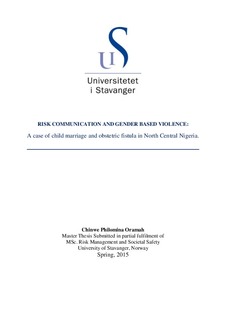Risk communication and gender based violence: a case of child marriage and obstetric fistula in North Central Nigeria
Master thesis
Permanent lenke
http://hdl.handle.net/11250/2354065Utgivelsesdato
2015-06-15Metadata
Vis full innførselSamlinger
- Studentoppgaver (SV-IMS) [1384]
Sammendrag
Gender based violence, often targeted against girl children in the name of child marriage has profound health problems, compromising victim’s physical and mental health as well as eroding their self-esteem. In addition to causing physical health problems, it is the most pervasive human rights violation in the world. Yet most of the gender based violent acts enjoy much socio-cultural support. Researches have shown increasing link between child marriage and fistula disease. This study focusses on child marriage in Jos North Nigeria; it explores and examines the various socio-cultural factors that have shaped child marriage response.
This study adopted integrated risk theory and social constructionist framework for understanding how socio-cultural factors shape child marriage prevalence. The research demonstrates that people’s concern and expectations with respect to threat, danger and risk event reflects their socio-cultural norms. Socio-cultural factors such as, cultural preservation, conflict, gender bias, trust building, institutional, social and cultural processes, shape the interpretation and evaluation of child marriage and its health implications. Thus, humans adapt to the material world, including threats and risk events through thought and conversations based on their knowledge, ideas, values and beliefs, which they share, or at least identify with within their socio-cultural context.
Key findings from the study, suggests that child marriage prevention in north central Nigeria is being compromised by cultural preservation and other socio-cultural factors embedded in societal institutions. Findings also highlighted that the conflict plaguing the North Central Nigeria is impacting child marriage prevalence in two ways. Firstly, it has created lack of trust between the people and governmental/non-governmental agencies and undermines the health concerns linked with the practice of child marriage. Secondly, it has increase the vulnerability of young girls to rape and other types of sexual violence by strangers leaving some parents with less choice than to give out their child in marriage when they are still considered pure. Conflict causes break down in important societal infrastructure and result in weakened health system that often times lags behind in provision of adequate health care for pregnant young girls. The young married girls are often expected to bear children soon after marriage, which makes them vulnerable to pregnancy and childbirth complications, including obstetric fistula. Research has noted that married adolescent have relatively little access to information about maternal health care thereby leaving room for the three types of delay that causes fistula.
Beskrivelse
Master's thesis in Risk management and societal safety

